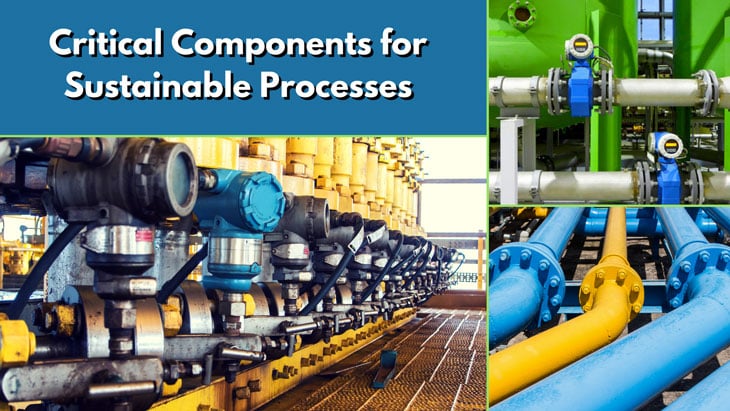This post was written by Gregory M. Gomez, vice president of flow instrumentation for Badger Meter.
Consumers, industry, and society in general benefit from a commitment to sustainability. This concept is not purely about conservation or “being green.” Sustainability is not about using less, but about using the right or necessary amount—reducing waste in the process. The value of sustainability as a business opportunity is balanced between altruistic ideas related to protecting the environment and the very practical economic drivers of maximizing process efficiency and revenue. In fact, research indicates that both business and consumers in the mainstream prioritize the related economic benefits of sustainability and view leaving a better environmental footprint as an important bonus. With process efficiency as the goal, cost savings, increased profits, customer goodwill, and yes, environmental benefits, result.

Flow measurement and instrumentation are critical components for making usage visible to manage sustainable processes and operations. The hospitality industry is a great example. It is common to see a card on the bathroom sink that asks us to conserve resources by hanging our towel back on the bar. Intuitively it is clear to us that less laundry is less water used by the hotel, but by how much exactly? It is difficult to manage what is not measured. Without an understanding of the true benefits of making the change, actually significantly decreasing water use is difficult.
Using flowmeters and analytics platforms available today, hotel management can make water use much more visible than a single line item on the water bill. Employing near-real-time data and analytics dashboards, management is able to truly see and manage water use across a variety of aspects of its operations (e.g., guest rooms, laundry, bars/restaurants, golf courses, other irrigation, industrial, process operations). The sign will be much more effective at influencing our behavior when the hotel can associate a specific percentage of water actually saved with hanging up the towel. This also produces a related savings in energy, supplies, and labor hours to the hotel. Plus, there is a public relations benefit to the guest who is interested in conserving water.
Accurate and reliable flow measurement and instrumentation directly lead to more efficient use of our precious, often expensive resources, and in turn, benefit the bottom line. More and more corporations see sustainability as a business opportunity, both in terms of maximizing efficiency and attracting “green-minded” customers.
The concept of sustainability has obvious ties to the efficient use of potable water, and it also relates to virtually any commercial or industrial process, including oil and gas production. The increasing use of water in unconventional production processes, like hydraulic fracturing, competes with the need for drinking water and irrigation for agriculture. For some, water use is also an environmental concern. The measurement and efficient use of water in these operations is important to managing costs and environmental impact.
Investors across any number of industries are also increasingly asking corporations to manage and report on their exposure to resource risks, including water, fossil fuels, and other key raw materials. Many publicly traded companies are including sustainability reporting in their annual reports. The interest of investors highlights that sustainability appeals to a variety of corporate stakeholders, including employees. Increasingly, younger generations want to work for a company that operates as a good corporate citizen, pursuing ideals beyond just maximizing profit. Sustainability can help employers attract and retain employees, helping manage critical human resources, an important component of an effective operation.
Finally, population growth and economic development are leading to a water-energy-food nexus. Each facet is critically important to society; each is facing increasing demands over the next several decades; and each competes with the other for use of finite global resources. Resource scarcity makes it important to long-term business success to use only the necessary amounts of limited resources, like water, petroleum, and other raw materials. The widespread understanding of this fact makes practicing sustainability in commercial and industrial processes a powerful opportunity to not only benefit the bottom line, but future generations as well.
About the Author Gregory M. Gomez is the VP of flow instrumentation for Badger Meter. He joined Badger Meter in 1984 as an intern with the Inroads program while a student at Marquette University. He held several engineering positions at Badger Meter from 1987 to 2009. In 2009, Gomez became VP of business development, where he was responsible for the execution of five acquisitions between 2010 and 2014. Gomez is or has been a member of the following boards: Discover World, Wisconsin Manufacturer’s Extension Partnership, Inroads: Milwaukee Advisory Board, Great Lake Regional Board, and National Board.
Gregory M. Gomez is the VP of flow instrumentation for Badger Meter. He joined Badger Meter in 1984 as an intern with the Inroads program while a student at Marquette University. He held several engineering positions at Badger Meter from 1987 to 2009. In 2009, Gomez became VP of business development, where he was responsible for the execution of five acquisitions between 2010 and 2014. Gomez is or has been a member of the following boards: Discover World, Wisconsin Manufacturer’s Extension Partnership, Inroads: Milwaukee Advisory Board, Great Lake Regional Board, and National Board.
A version of this article also was published at InTech magazine.



